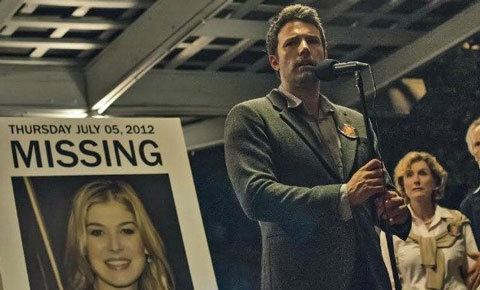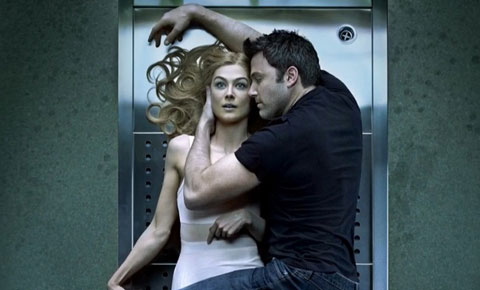Unfortunately, it's also one of those films you cannot say too much about, as its pleasure lies in the thrilling journey from its haunting opening scene to its numbing final frame.
Fincher believes the less said about the film's plot perhaps the better. "I think this movie is best enjoyed walking in cold," he says. "People love watching a movie where they don't know where it's going to go next. They go to the movies to be surprised."
Based on Gillian Flynn's best seller, Gone Girl offers a wild ride through our modern media culture and down into the deep, dark fault lines of an American marriage - in all its unreliable promises, inescapable deceits and pitch-black comedy.

The couple at the centre of the story - former New York writer Nick Dunne (Ben Aflleck) and his formerly 'cool girl' wife Amy (Rosamund Pike) have all the sinuous outer contours of contemporary marital bliss. But on the occasion of their fifth wedding anniversary Amy goes missing and those contours crack into a maze of fissures. Nick becomes the prime suspect, shrouded in a fog of suspicious behaviour. Amy becomes the vaunted object of a media frenzy as the search for her, dead or alive, plays out before the eyes of a world thirsting for revelations.
Just as Nick and Amy personified the quintessential romantic match, Amy's disappearance has all the markings of an emblematic domestic American crime, but her vanishing becomes a kind of hall of mirrors in which tantalising and savage secrets lead to tantalising and savage secrets.
The events that unfold are thick with shocks and complications, but the questions that remain are what cut, with razor-sharp precision, to the bone: Who is Nick? Who is Amy? Who are any of us in marriages and a society built on a precarious base of projected images and disguises?
Upon its 2012 publication, Gillian Flynn's novel Gone Girl became that rare entity: a massively popular, nail-biting summer best seller that was also the talk of the literary world.
The book was lauded not only for relentless suspense, but also for its narrative ingenuity and willingness to plumb the murkiest depths of human behaviour, grappling with the jagged lines between marriage and possession, public and private life, the lure of artifice and the glare of truth. Even in the crime fiction genre it stood out for its fusing of two stunningly unreliable, duelling narrators - the two halves of a torn marriage - who manipulate each other, tangling the reader in their webs of deceit.

The novel was a visceral cinematic experience, but filled with pitfalls for a screen adaptation. So strong were the voices in the book that it seemed unlikely that anyone could ever adapt it as well as its author. Fortunately, Flynn was up for taking on the daunting task and produced a screenplay that boiled the essence of her deftly plotted, but deeply interior, novel down into a skin-tight structure.
Then a synergy occurred between Flynn and David Fincher. The pairing of Flynn's merciless insights with Fincher's atmospheric storytelling made a potent mix with the drippingly dark humour of the story - and its skew on marriage, celebrity and the way we mould and remould our life stories.
"It was as if David interpreted what Gillian wrote and then that interpretation was put back through Gillian again on the page," says Ben Affleck. "And during that process there was even more wit added; there was more sardonic stuff and there were so many salient observations. It really fits into David's work and has that distinctive combination of being at once funny and enlivening."
Flynn has always seen Fincher as a potential accomplice. "Even as I was writing the novel, there were certain scenes I pictured him filming-I could see them through his lens," Flynn comments. "I knew he'd bring a great sense of place and I knew he'd capture the suspense and claustrophobia of the story. Everyone knows Fincher can do dread. But what I have always loved about his films is his dark bursts of humour. Gone Girl, for all its nastiness, has moments of humour, too, and I knew he'd bring those to the screen. I felt, too, that he wouldn't turn Gone Girl into a rigid whodunnit, but would find room to explore what the story is really about, which is this marriage."

Fincher used the story's nascent humour as a kind of dark marinade to soak into the visuals and performances. "People laugh in movies when they see something that is true," says Fincher. "That's what brings them out of their shells in the dark. If you then get the right people to carry the drama - and you encourage them to find what's human about it all - that's how you breathe life into it."
If there's one reason to see Gone Girl, it's for its outstanding performances, with the cast delivering their best (and sometimes going to the extreme) under Fincher's direction.
Working with Fincher's distinctive process was exhilarating for Affleck. "In most movies you spend two-thirds of the time sitting in your trailer and one-third shooting, but the ratio is reversed with David or even more so, where you spend maybe only 10% of the time not working," he explains. "The whole structure he creates on set is about the characters, the story and there are no other distractions. I've learned a lot from working with David. He has a real efficiency and a driving sense of what he wants. He's also steeped in the technology that underpins the film industry - and to have the mind of an engineer and the taste of an artist is a very rare combination."
Playing Amy took Pike through physical and emotional extremes. "The challenge was peeling back one layer after another of the onion that is this marriage," she comments. But she says along with the challenges came rich rewards, especially working with Fincher. "David is so detailed in the most psychologically observant ways - and because he wants to explore everything, he leaves you feeling that no stone was left unturned," she says.
For Neil Patrick Harris, Amy's former boyfriend, working with Fincher for the first time was also a revelation. "I've been a big fan of what he has created on screen, but watching him create in person made me even more so," he says. "He has such deep passion for the entirety of the filmmaking process - from light refractions and dolly moves to pacing and the written word. He is a true director in the most dynamic sense."
Harris especially enjoyed Fincher's way of peering into the infinitesimal details of performance. "It felt like we were all in a kind of meditation together," he says, "and you knew by the time David was happy, a scene had been distilled to its essence. I think he's a visual poet, nay a sculptor. He takes a moment and chips away until he gets at something true."
Gone Girl definitely gets my vote as one of the best films of 2014. It does what film should, skilfully draws you into a mystery you can never escape from and powerfully delivers a hard-hitting resolution that you would never have thought of in your wildest imagination.
Read more about Gone Girl and other new films opening this week at www.writingstudio.co.za
